Effectiveness of Depression Disorder Treatments
VerifiedAdded on 2023/06/11
|13
|4006
|120
AI Summary
This article compares the effectiveness of pharmacotherapy and cognitive behavior therapy (CBT) in treating depression disorder. It discusses the benefits and drawbacks of each treatment and suggests a combination of both for best results. It also includes studies and guidelines from the Australian health system.
Contribute Materials
Your contribution can guide someone’s learning journey. Share your
documents today.
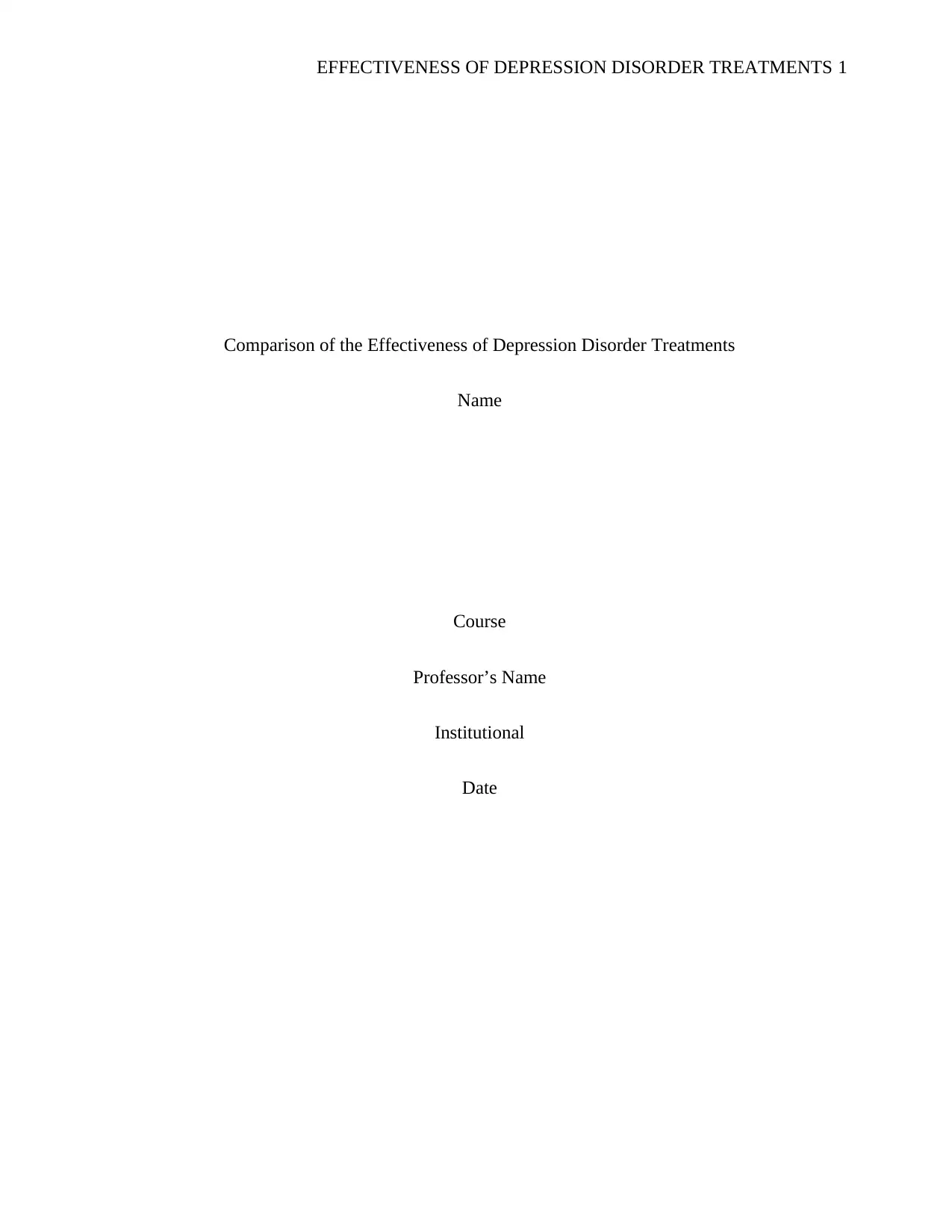
EFFECTIVENESS OF DEPRESSION DISORDER TREATMENTS 1
Comparison of the Effectiveness of Depression Disorder Treatments
Name
Course
Professor’s Name
Institutional
Date
Comparison of the Effectiveness of Depression Disorder Treatments
Name
Course
Professor’s Name
Institutional
Date
Secure Best Marks with AI Grader
Need help grading? Try our AI Grader for instant feedback on your assignments.
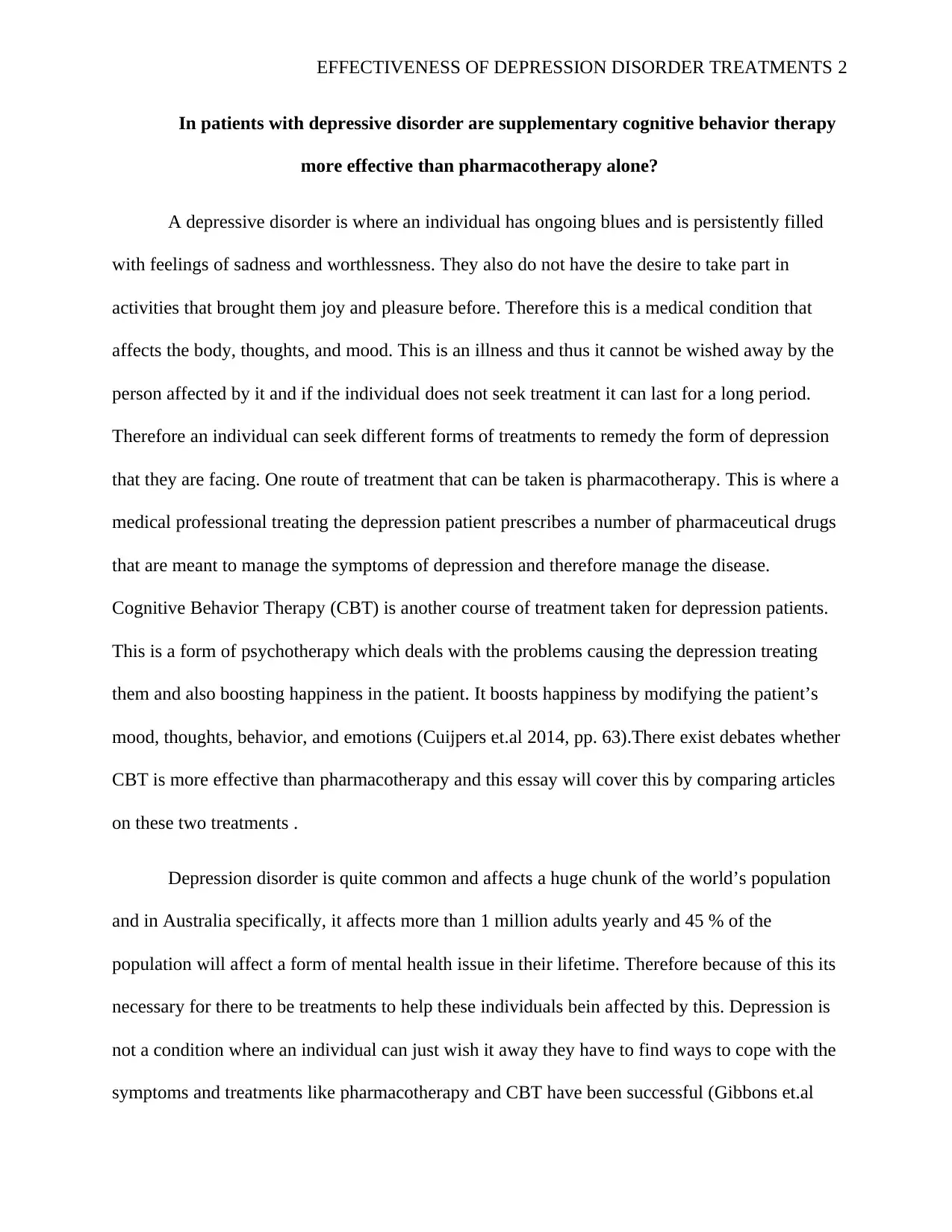
EFFECTIVENESS OF DEPRESSION DISORDER TREATMENTS 2
In patients with depressive disorder are supplementary cognitive behavior therapy
more effective than pharmacotherapy alone?
A depressive disorder is where an individual has ongoing blues and is persistently filled
with feelings of sadness and worthlessness. They also do not have the desire to take part in
activities that brought them joy and pleasure before. Therefore this is a medical condition that
affects the body, thoughts, and mood. This is an illness and thus it cannot be wished away by the
person affected by it and if the individual does not seek treatment it can last for a long period.
Therefore an individual can seek different forms of treatments to remedy the form of depression
that they are facing. One route of treatment that can be taken is pharmacotherapy. This is where a
medical professional treating the depression patient prescribes a number of pharmaceutical drugs
that are meant to manage the symptoms of depression and therefore manage the disease.
Cognitive Behavior Therapy (CBT) is another course of treatment taken for depression patients.
This is a form of psychotherapy which deals with the problems causing the depression treating
them and also boosting happiness in the patient. It boosts happiness by modifying the patient’s
mood, thoughts, behavior, and emotions (Cuijpers et.al 2014, pp. 63).There exist debates whether
CBT is more effective than pharmacotherapy and this essay will cover this by comparing articles
on these two treatments .
Depression disorder is quite common and affects a huge chunk of the world’s population
and in Australia specifically, it affects more than 1 million adults yearly and 45 % of the
population will affect a form of mental health issue in their lifetime. Therefore because of this its
necessary for there to be treatments to help these individuals bein affected by this. Depression is
not a condition where an individual can just wish it away they have to find ways to cope with the
symptoms and treatments like pharmacotherapy and CBT have been successful (Gibbons et.al
In patients with depressive disorder are supplementary cognitive behavior therapy
more effective than pharmacotherapy alone?
A depressive disorder is where an individual has ongoing blues and is persistently filled
with feelings of sadness and worthlessness. They also do not have the desire to take part in
activities that brought them joy and pleasure before. Therefore this is a medical condition that
affects the body, thoughts, and mood. This is an illness and thus it cannot be wished away by the
person affected by it and if the individual does not seek treatment it can last for a long period.
Therefore an individual can seek different forms of treatments to remedy the form of depression
that they are facing. One route of treatment that can be taken is pharmacotherapy. This is where a
medical professional treating the depression patient prescribes a number of pharmaceutical drugs
that are meant to manage the symptoms of depression and therefore manage the disease.
Cognitive Behavior Therapy (CBT) is another course of treatment taken for depression patients.
This is a form of psychotherapy which deals with the problems causing the depression treating
them and also boosting happiness in the patient. It boosts happiness by modifying the patient’s
mood, thoughts, behavior, and emotions (Cuijpers et.al 2014, pp. 63).There exist debates whether
CBT is more effective than pharmacotherapy and this essay will cover this by comparing articles
on these two treatments .
Depression disorder is quite common and affects a huge chunk of the world’s population
and in Australia specifically, it affects more than 1 million adults yearly and 45 % of the
population will affect a form of mental health issue in their lifetime. Therefore because of this its
necessary for there to be treatments to help these individuals bein affected by this. Depression is
not a condition where an individual can just wish it away they have to find ways to cope with the
symptoms and treatments like pharmacotherapy and CBT have been successful (Gibbons et.al
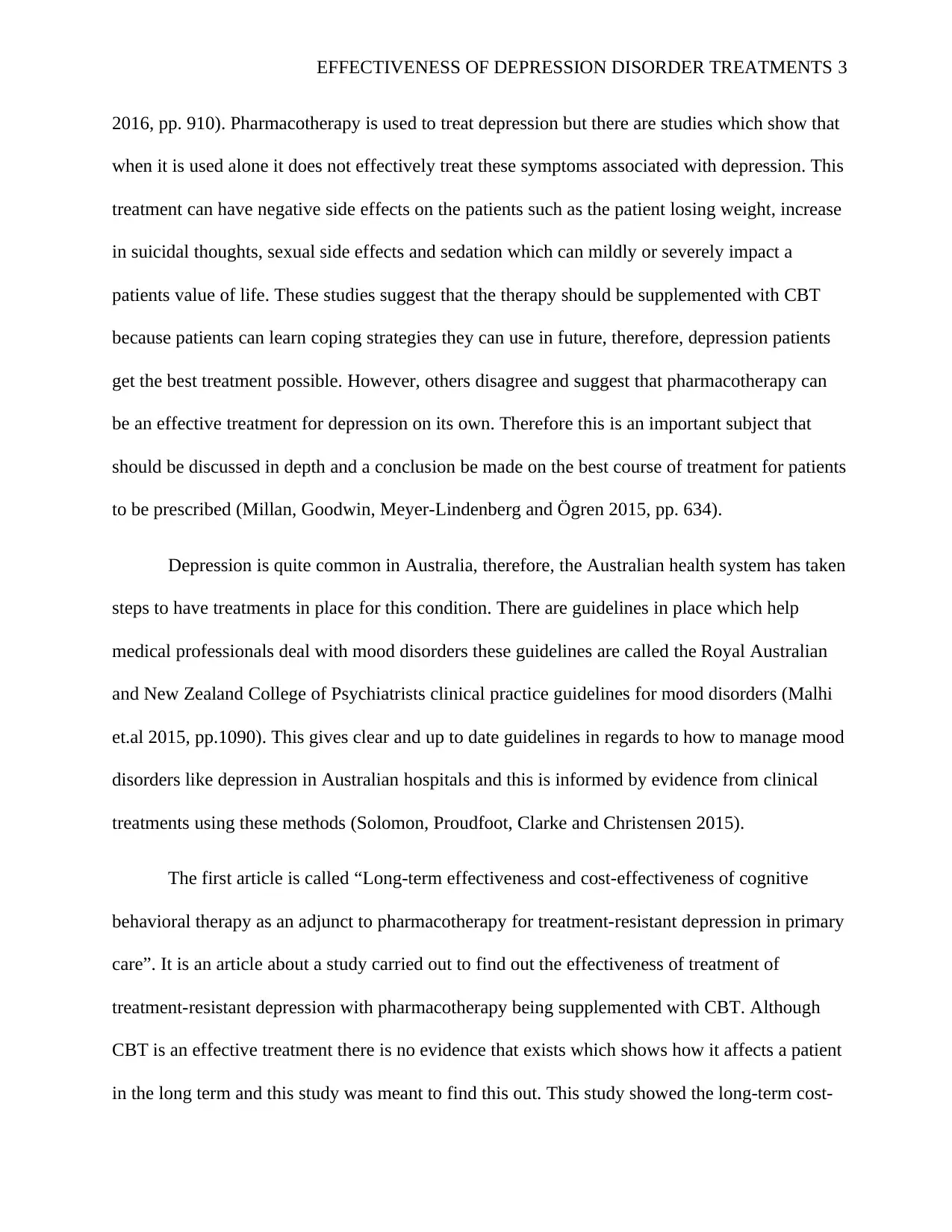
EFFECTIVENESS OF DEPRESSION DISORDER TREATMENTS 3
2016, pp. 910). Pharmacotherapy is used to treat depression but there are studies which show that
when it is used alone it does not effectively treat these symptoms associated with depression. This
treatment can have negative side effects on the patients such as the patient losing weight, increase
in suicidal thoughts, sexual side effects and sedation which can mildly or severely impact a
patients value of life. These studies suggest that the therapy should be supplemented with CBT
because patients can learn coping strategies they can use in future, therefore, depression patients
get the best treatment possible. However, others disagree and suggest that pharmacotherapy can
be an effective treatment for depression on its own. Therefore this is an important subject that
should be discussed in depth and a conclusion be made on the best course of treatment for patients
to be prescribed (Millan, Goodwin, Meyer-Lindenberg and Ögren 2015, pp. 634).
Depression is quite common in Australia, therefore, the Australian health system has taken
steps to have treatments in place for this condition. There are guidelines in place which help
medical professionals deal with mood disorders these guidelines are called the Royal Australian
and New Zealand College of Psychiatrists clinical practice guidelines for mood disorders (Malhi
et.al 2015, pp.1090). This gives clear and up to date guidelines in regards to how to manage mood
disorders like depression in Australian hospitals and this is informed by evidence from clinical
treatments using these methods (Solomon, Proudfoot, Clarke and Christensen 2015).
The first article is called “Long-term effectiveness and cost-effectiveness of cognitive
behavioral therapy as an adjunct to pharmacotherapy for treatment-resistant depression in primary
care”. It is an article about a study carried out to find out the effectiveness of treatment of
treatment-resistant depression with pharmacotherapy being supplemented with CBT. Although
CBT is an effective treatment there is no evidence that exists which shows how it affects a patient
in the long term and this study was meant to find this out. This study showed the long-term cost-
2016, pp. 910). Pharmacotherapy is used to treat depression but there are studies which show that
when it is used alone it does not effectively treat these symptoms associated with depression. This
treatment can have negative side effects on the patients such as the patient losing weight, increase
in suicidal thoughts, sexual side effects and sedation which can mildly or severely impact a
patients value of life. These studies suggest that the therapy should be supplemented with CBT
because patients can learn coping strategies they can use in future, therefore, depression patients
get the best treatment possible. However, others disagree and suggest that pharmacotherapy can
be an effective treatment for depression on its own. Therefore this is an important subject that
should be discussed in depth and a conclusion be made on the best course of treatment for patients
to be prescribed (Millan, Goodwin, Meyer-Lindenberg and Ögren 2015, pp. 634).
Depression is quite common in Australia, therefore, the Australian health system has taken
steps to have treatments in place for this condition. There are guidelines in place which help
medical professionals deal with mood disorders these guidelines are called the Royal Australian
and New Zealand College of Psychiatrists clinical practice guidelines for mood disorders (Malhi
et.al 2015, pp.1090). This gives clear and up to date guidelines in regards to how to manage mood
disorders like depression in Australian hospitals and this is informed by evidence from clinical
treatments using these methods (Solomon, Proudfoot, Clarke and Christensen 2015).
The first article is called “Long-term effectiveness and cost-effectiveness of cognitive
behavioral therapy as an adjunct to pharmacotherapy for treatment-resistant depression in primary
care”. It is an article about a study carried out to find out the effectiveness of treatment of
treatment-resistant depression with pharmacotherapy being supplemented with CBT. Although
CBT is an effective treatment there is no evidence that exists which shows how it affects a patient
in the long term and this study was meant to find this out. This study showed the long-term cost-
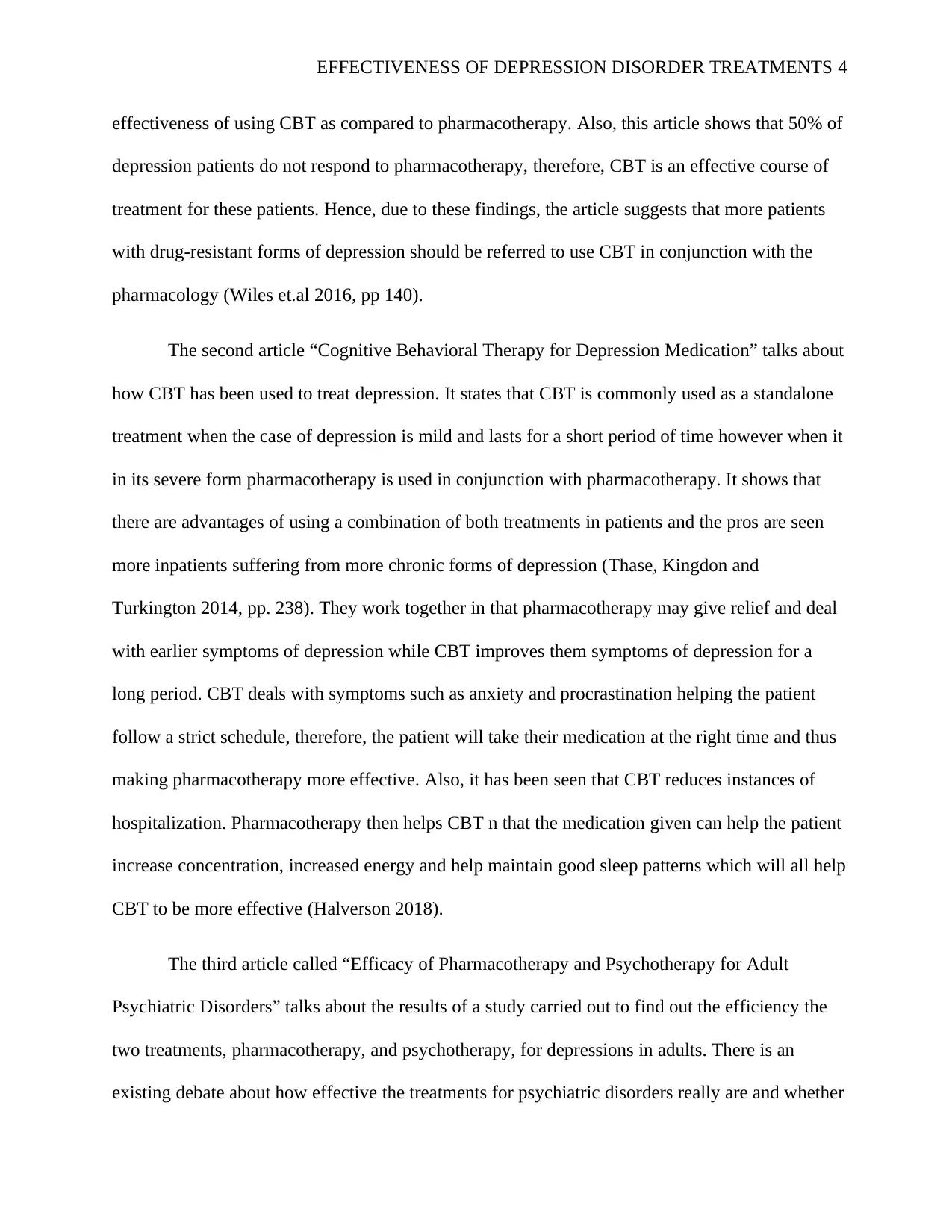
EFFECTIVENESS OF DEPRESSION DISORDER TREATMENTS 4
effectiveness of using CBT as compared to pharmacotherapy. Also, this article shows that 50% of
depression patients do not respond to pharmacotherapy, therefore, CBT is an effective course of
treatment for these patients. Hence, due to these findings, the article suggests that more patients
with drug-resistant forms of depression should be referred to use CBT in conjunction with the
pharmacology (Wiles et.al 2016, pp 140).
The second article “Cognitive Behavioral Therapy for Depression Medication” talks about
how CBT has been used to treat depression. It states that CBT is commonly used as a standalone
treatment when the case of depression is mild and lasts for a short period of time however when it
in its severe form pharmacotherapy is used in conjunction with pharmacotherapy. It shows that
there are advantages of using a combination of both treatments in patients and the pros are seen
more inpatients suffering from more chronic forms of depression (Thase, Kingdon and
Turkington 2014, pp. 238). They work together in that pharmacotherapy may give relief and deal
with earlier symptoms of depression while CBT improves them symptoms of depression for a
long period. CBT deals with symptoms such as anxiety and procrastination helping the patient
follow a strict schedule, therefore, the patient will take their medication at the right time and thus
making pharmacotherapy more effective. Also, it has been seen that CBT reduces instances of
hospitalization. Pharmacotherapy then helps CBT n that the medication given can help the patient
increase concentration, increased energy and help maintain good sleep patterns which will all help
CBT to be more effective (Halverson 2018).
The third article called “Efficacy of Pharmacotherapy and Psychotherapy for Adult
Psychiatric Disorders” talks about the results of a study carried out to find out the efficiency the
two treatments, pharmacotherapy, and psychotherapy, for depressions in adults. There is an
existing debate about how effective the treatments for psychiatric disorders really are and whether
effectiveness of using CBT as compared to pharmacotherapy. Also, this article shows that 50% of
depression patients do not respond to pharmacotherapy, therefore, CBT is an effective course of
treatment for these patients. Hence, due to these findings, the article suggests that more patients
with drug-resistant forms of depression should be referred to use CBT in conjunction with the
pharmacology (Wiles et.al 2016, pp 140).
The second article “Cognitive Behavioral Therapy for Depression Medication” talks about
how CBT has been used to treat depression. It states that CBT is commonly used as a standalone
treatment when the case of depression is mild and lasts for a short period of time however when it
in its severe form pharmacotherapy is used in conjunction with pharmacotherapy. It shows that
there are advantages of using a combination of both treatments in patients and the pros are seen
more inpatients suffering from more chronic forms of depression (Thase, Kingdon and
Turkington 2014, pp. 238). They work together in that pharmacotherapy may give relief and deal
with earlier symptoms of depression while CBT improves them symptoms of depression for a
long period. CBT deals with symptoms such as anxiety and procrastination helping the patient
follow a strict schedule, therefore, the patient will take their medication at the right time and thus
making pharmacotherapy more effective. Also, it has been seen that CBT reduces instances of
hospitalization. Pharmacotherapy then helps CBT n that the medication given can help the patient
increase concentration, increased energy and help maintain good sleep patterns which will all help
CBT to be more effective (Halverson 2018).
The third article called “Efficacy of Pharmacotherapy and Psychotherapy for Adult
Psychiatric Disorders” talks about the results of a study carried out to find out the efficiency the
two treatments, pharmacotherapy, and psychotherapy, for depressions in adults. There is an
existing debate about how effective the treatments for psychiatric disorders really are and whether
Secure Best Marks with AI Grader
Need help grading? Try our AI Grader for instant feedback on your assignments.
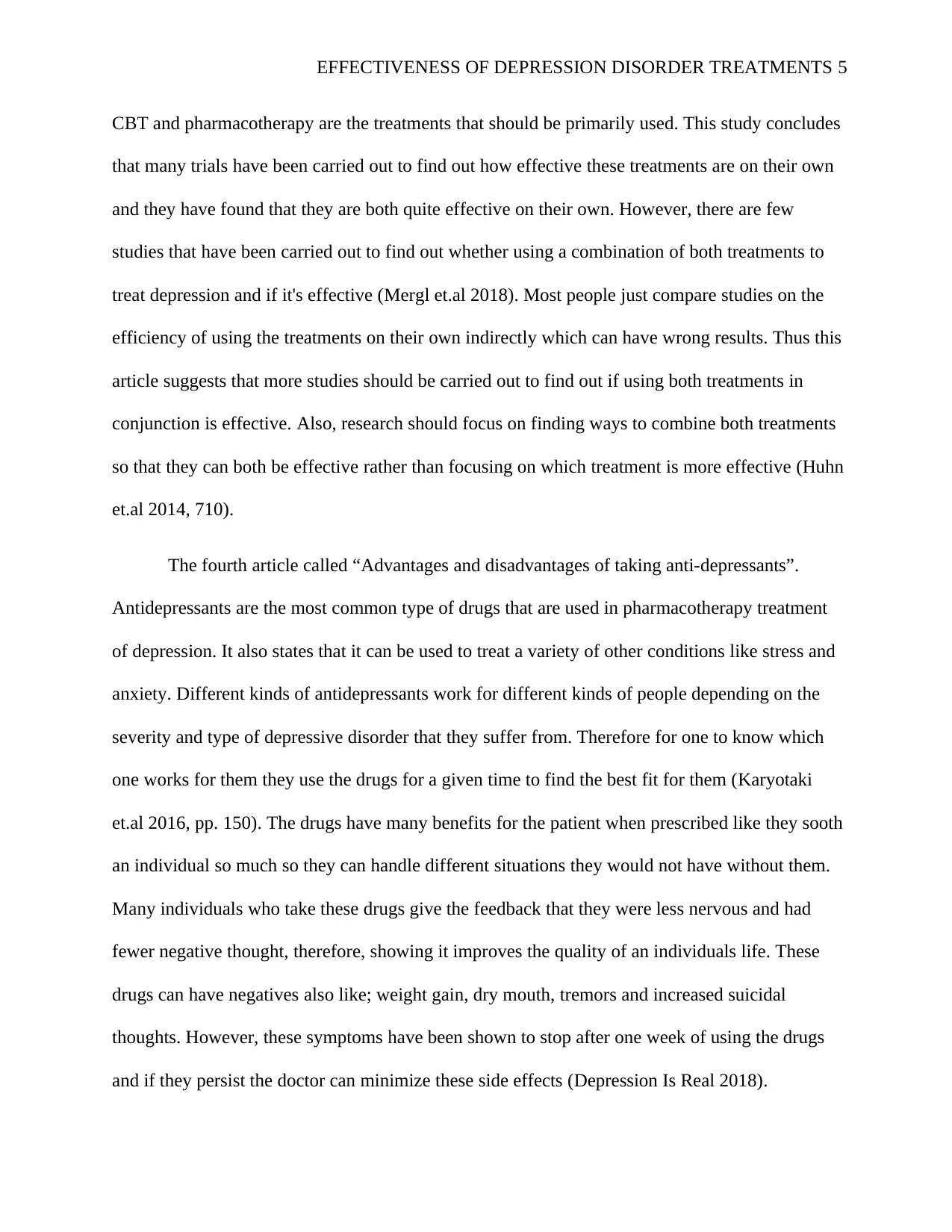
EFFECTIVENESS OF DEPRESSION DISORDER TREATMENTS 5
CBT and pharmacotherapy are the treatments that should be primarily used. This study concludes
that many trials have been carried out to find out how effective these treatments are on their own
and they have found that they are both quite effective on their own. However, there are few
studies that have been carried out to find out whether using a combination of both treatments to
treat depression and if it's effective (Mergl et.al 2018). Most people just compare studies on the
efficiency of using the treatments on their own indirectly which can have wrong results. Thus this
article suggests that more studies should be carried out to find out if using both treatments in
conjunction is effective. Also, research should focus on finding ways to combine both treatments
so that they can both be effective rather than focusing on which treatment is more effective (Huhn
et.al 2014, 710).
The fourth article called “Advantages and disadvantages of taking anti-depressants”.
Antidepressants are the most common type of drugs that are used in pharmacotherapy treatment
of depression. It also states that it can be used to treat a variety of other conditions like stress and
anxiety. Different kinds of antidepressants work for different kinds of people depending on the
severity and type of depressive disorder that they suffer from. Therefore for one to know which
one works for them they use the drugs for a given time to find the best fit for them (Karyotaki
et.al 2016, pp. 150). The drugs have many benefits for the patient when prescribed like they sooth
an individual so much so they can handle different situations they would not have without them.
Many individuals who take these drugs give the feedback that they were less nervous and had
fewer negative thought, therefore, showing it improves the quality of an individuals life. These
drugs can have negatives also like; weight gain, dry mouth, tremors and increased suicidal
thoughts. However, these symptoms have been shown to stop after one week of using the drugs
and if they persist the doctor can minimize these side effects (Depression Is Real 2018).
CBT and pharmacotherapy are the treatments that should be primarily used. This study concludes
that many trials have been carried out to find out how effective these treatments are on their own
and they have found that they are both quite effective on their own. However, there are few
studies that have been carried out to find out whether using a combination of both treatments to
treat depression and if it's effective (Mergl et.al 2018). Most people just compare studies on the
efficiency of using the treatments on their own indirectly which can have wrong results. Thus this
article suggests that more studies should be carried out to find out if using both treatments in
conjunction is effective. Also, research should focus on finding ways to combine both treatments
so that they can both be effective rather than focusing on which treatment is more effective (Huhn
et.al 2014, 710).
The fourth article called “Advantages and disadvantages of taking anti-depressants”.
Antidepressants are the most common type of drugs that are used in pharmacotherapy treatment
of depression. It also states that it can be used to treat a variety of other conditions like stress and
anxiety. Different kinds of antidepressants work for different kinds of people depending on the
severity and type of depressive disorder that they suffer from. Therefore for one to know which
one works for them they use the drugs for a given time to find the best fit for them (Karyotaki
et.al 2016, pp. 150). The drugs have many benefits for the patient when prescribed like they sooth
an individual so much so they can handle different situations they would not have without them.
Many individuals who take these drugs give the feedback that they were less nervous and had
fewer negative thought, therefore, showing it improves the quality of an individuals life. These
drugs can have negatives also like; weight gain, dry mouth, tremors and increased suicidal
thoughts. However, these symptoms have been shown to stop after one week of using the drugs
and if they persist the doctor can minimize these side effects (Depression Is Real 2018).
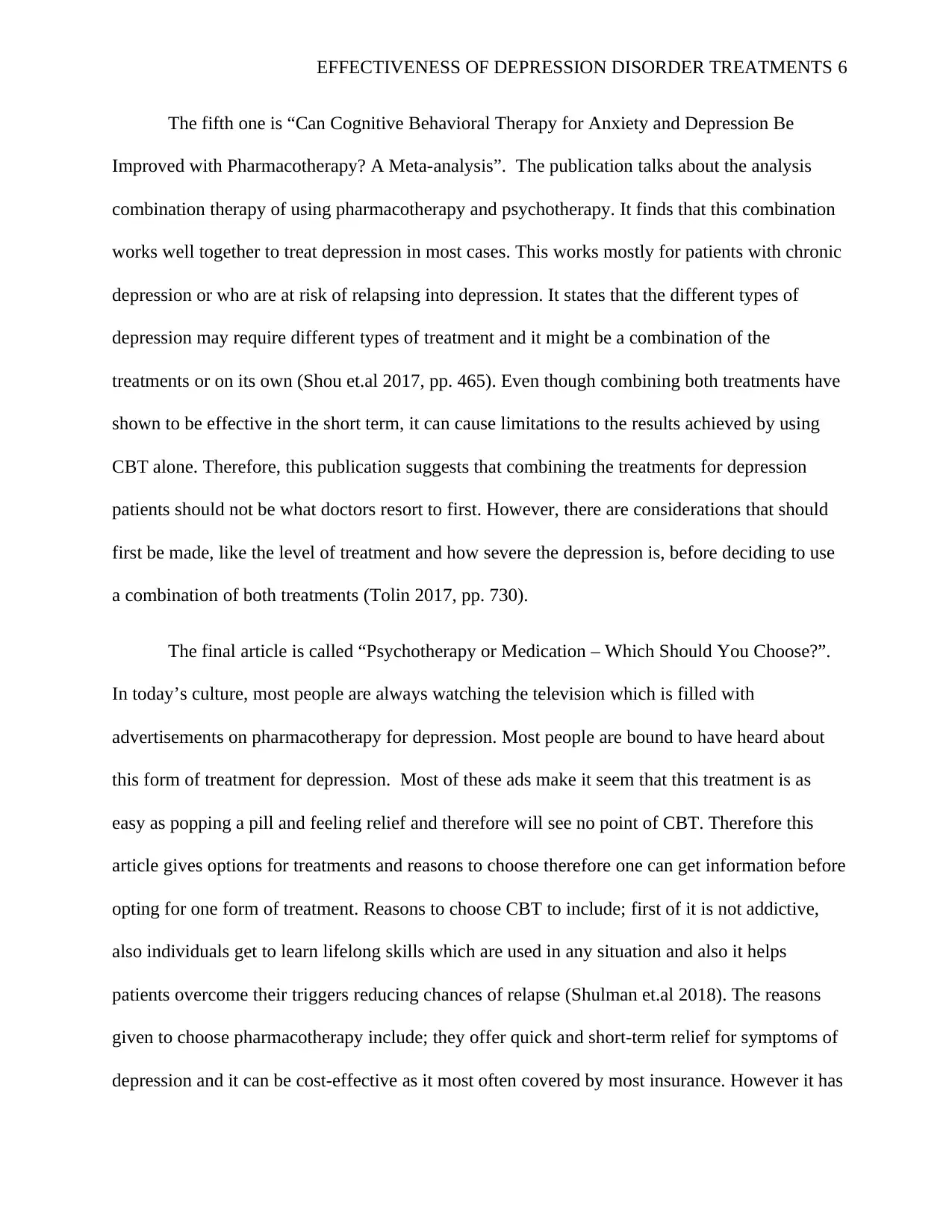
EFFECTIVENESS OF DEPRESSION DISORDER TREATMENTS 6
The fifth one is “Can Cognitive Behavioral Therapy for Anxiety and Depression Be
Improved with Pharmacotherapy? A Meta-analysis”. The publication talks about the analysis
combination therapy of using pharmacotherapy and psychotherapy. It finds that this combination
works well together to treat depression in most cases. This works mostly for patients with chronic
depression or who are at risk of relapsing into depression. It states that the different types of
depression may require different types of treatment and it might be a combination of the
treatments or on its own (Shou et.al 2017, pp. 465). Even though combining both treatments have
shown to be effective in the short term, it can cause limitations to the results achieved by using
CBT alone. Therefore, this publication suggests that combining the treatments for depression
patients should not be what doctors resort to first. However, there are considerations that should
first be made, like the level of treatment and how severe the depression is, before deciding to use
a combination of both treatments (Tolin 2017, pp. 730).
The final article is called “Psychotherapy or Medication – Which Should You Choose?”.
In today’s culture, most people are always watching the television which is filled with
advertisements on pharmacotherapy for depression. Most people are bound to have heard about
this form of treatment for depression. Most of these ads make it seem that this treatment is as
easy as popping a pill and feeling relief and therefore will see no point of CBT. Therefore this
article gives options for treatments and reasons to choose therefore one can get information before
opting for one form of treatment. Reasons to choose CBT to include; first of it is not addictive,
also individuals get to learn lifelong skills which are used in any situation and also it helps
patients overcome their triggers reducing chances of relapse (Shulman et.al 2018). The reasons
given to choose pharmacotherapy include; they offer quick and short-term relief for symptoms of
depression and it can be cost-effective as it most often covered by most insurance. However it has
The fifth one is “Can Cognitive Behavioral Therapy for Anxiety and Depression Be
Improved with Pharmacotherapy? A Meta-analysis”. The publication talks about the analysis
combination therapy of using pharmacotherapy and psychotherapy. It finds that this combination
works well together to treat depression in most cases. This works mostly for patients with chronic
depression or who are at risk of relapsing into depression. It states that the different types of
depression may require different types of treatment and it might be a combination of the
treatments or on its own (Shou et.al 2017, pp. 465). Even though combining both treatments have
shown to be effective in the short term, it can cause limitations to the results achieved by using
CBT alone. Therefore, this publication suggests that combining the treatments for depression
patients should not be what doctors resort to first. However, there are considerations that should
first be made, like the level of treatment and how severe the depression is, before deciding to use
a combination of both treatments (Tolin 2017, pp. 730).
The final article is called “Psychotherapy or Medication – Which Should You Choose?”.
In today’s culture, most people are always watching the television which is filled with
advertisements on pharmacotherapy for depression. Most people are bound to have heard about
this form of treatment for depression. Most of these ads make it seem that this treatment is as
easy as popping a pill and feeling relief and therefore will see no point of CBT. Therefore this
article gives options for treatments and reasons to choose therefore one can get information before
opting for one form of treatment. Reasons to choose CBT to include; first of it is not addictive,
also individuals get to learn lifelong skills which are used in any situation and also it helps
patients overcome their triggers reducing chances of relapse (Shulman et.al 2018). The reasons
given to choose pharmacotherapy include; they offer quick and short-term relief for symptoms of
depression and it can be cost-effective as it most often covered by most insurance. However it has
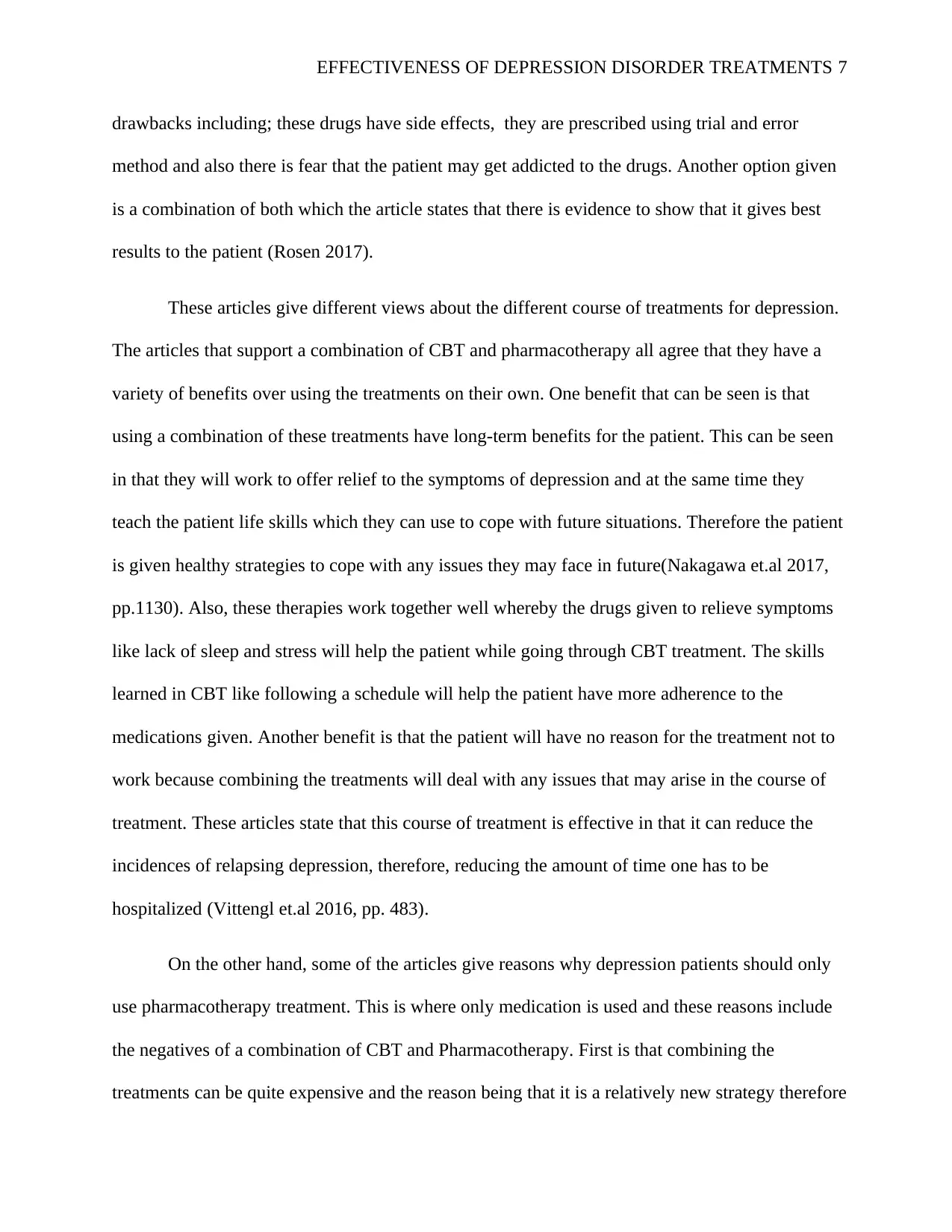
EFFECTIVENESS OF DEPRESSION DISORDER TREATMENTS 7
drawbacks including; these drugs have side effects, they are prescribed using trial and error
method and also there is fear that the patient may get addicted to the drugs. Another option given
is a combination of both which the article states that there is evidence to show that it gives best
results to the patient (Rosen 2017).
These articles give different views about the different course of treatments for depression.
The articles that support a combination of CBT and pharmacotherapy all agree that they have a
variety of benefits over using the treatments on their own. One benefit that can be seen is that
using a combination of these treatments have long-term benefits for the patient. This can be seen
in that they will work to offer relief to the symptoms of depression and at the same time they
teach the patient life skills which they can use to cope with future situations. Therefore the patient
is given healthy strategies to cope with any issues they may face in future(Nakagawa et.al 2017,
pp.1130). Also, these therapies work together well whereby the drugs given to relieve symptoms
like lack of sleep and stress will help the patient while going through CBT treatment. The skills
learned in CBT like following a schedule will help the patient have more adherence to the
medications given. Another benefit is that the patient will have no reason for the treatment not to
work because combining the treatments will deal with any issues that may arise in the course of
treatment. These articles state that this course of treatment is effective in that it can reduce the
incidences of relapsing depression, therefore, reducing the amount of time one has to be
hospitalized (Vittengl et.al 2016, pp. 483).
On the other hand, some of the articles give reasons why depression patients should only
use pharmacotherapy treatment. This is where only medication is used and these reasons include
the negatives of a combination of CBT and Pharmacotherapy. First is that combining the
treatments can be quite expensive and the reason being that it is a relatively new strategy therefore
drawbacks including; these drugs have side effects, they are prescribed using trial and error
method and also there is fear that the patient may get addicted to the drugs. Another option given
is a combination of both which the article states that there is evidence to show that it gives best
results to the patient (Rosen 2017).
These articles give different views about the different course of treatments for depression.
The articles that support a combination of CBT and pharmacotherapy all agree that they have a
variety of benefits over using the treatments on their own. One benefit that can be seen is that
using a combination of these treatments have long-term benefits for the patient. This can be seen
in that they will work to offer relief to the symptoms of depression and at the same time they
teach the patient life skills which they can use to cope with future situations. Therefore the patient
is given healthy strategies to cope with any issues they may face in future(Nakagawa et.al 2017,
pp.1130). Also, these therapies work together well whereby the drugs given to relieve symptoms
like lack of sleep and stress will help the patient while going through CBT treatment. The skills
learned in CBT like following a schedule will help the patient have more adherence to the
medications given. Another benefit is that the patient will have no reason for the treatment not to
work because combining the treatments will deal with any issues that may arise in the course of
treatment. These articles state that this course of treatment is effective in that it can reduce the
incidences of relapsing depression, therefore, reducing the amount of time one has to be
hospitalized (Vittengl et.al 2016, pp. 483).
On the other hand, some of the articles give reasons why depression patients should only
use pharmacotherapy treatment. This is where only medication is used and these reasons include
the negatives of a combination of CBT and Pharmacotherapy. First is that combining the
treatments can be quite expensive and the reason being that it is a relatively new strategy therefore
Paraphrase This Document
Need a fresh take? Get an instant paraphrase of this document with our AI Paraphraser
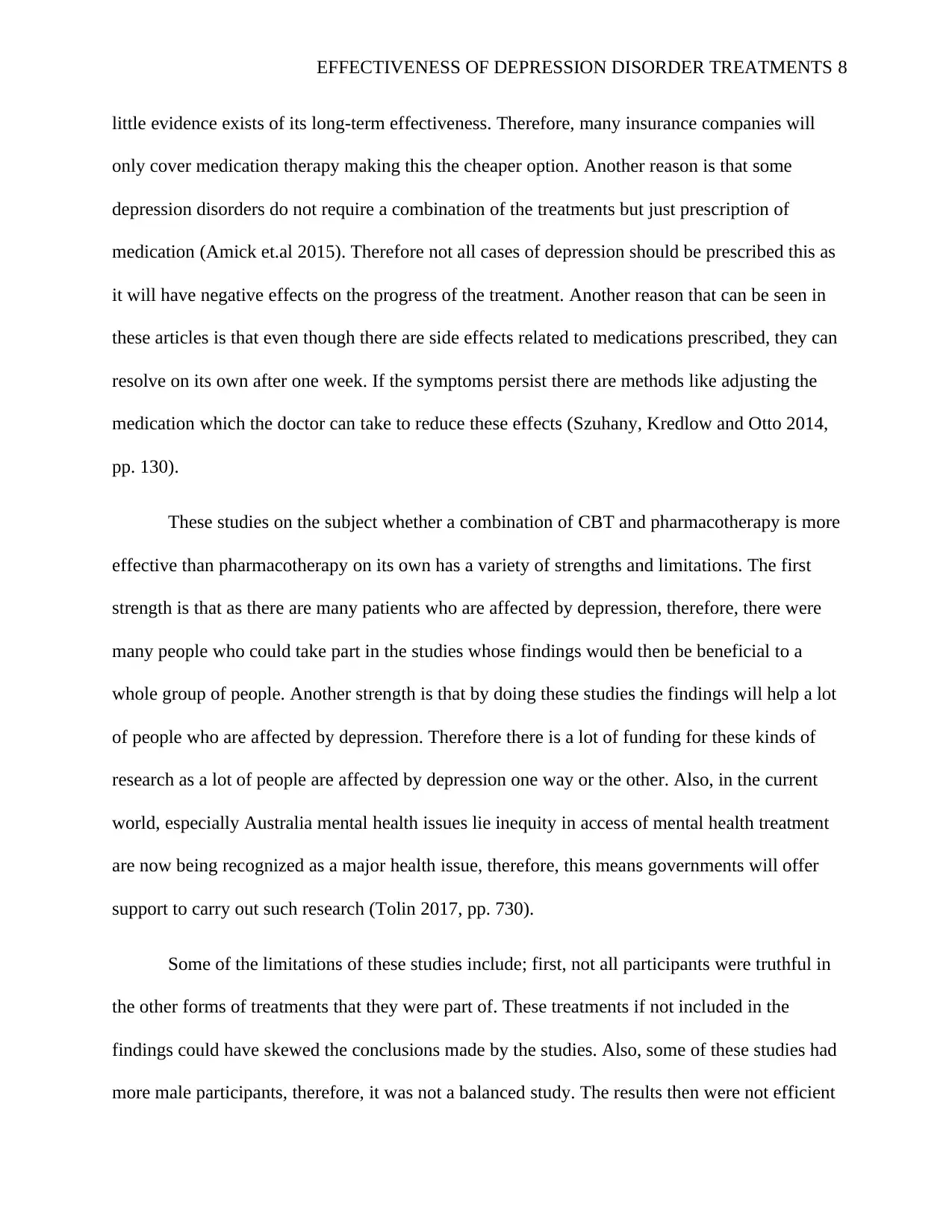
EFFECTIVENESS OF DEPRESSION DISORDER TREATMENTS 8
little evidence exists of its long-term effectiveness. Therefore, many insurance companies will
only cover medication therapy making this the cheaper option. Another reason is that some
depression disorders do not require a combination of the treatments but just prescription of
medication (Amick et.al 2015). Therefore not all cases of depression should be prescribed this as
it will have negative effects on the progress of the treatment. Another reason that can be seen in
these articles is that even though there are side effects related to medications prescribed, they can
resolve on its own after one week. If the symptoms persist there are methods like adjusting the
medication which the doctor can take to reduce these effects (Szuhany, Kredlow and Otto 2014,
pp. 130).
These studies on the subject whether a combination of CBT and pharmacotherapy is more
effective than pharmacotherapy on its own has a variety of strengths and limitations. The first
strength is that as there are many patients who are affected by depression, therefore, there were
many people who could take part in the studies whose findings would then be beneficial to a
whole group of people. Another strength is that by doing these studies the findings will help a lot
of people who are affected by depression. Therefore there is a lot of funding for these kinds of
research as a lot of people are affected by depression one way or the other. Also, in the current
world, especially Australia mental health issues lie inequity in access of mental health treatment
are now being recognized as a major health issue, therefore, this means governments will offer
support to carry out such research (Tolin 2017, pp. 730).
Some of the limitations of these studies include; first, not all participants were truthful in
the other forms of treatments that they were part of. These treatments if not included in the
findings could have skewed the conclusions made by the studies. Also, some of these studies had
more male participants, therefore, it was not a balanced study. The results then were not efficient
little evidence exists of its long-term effectiveness. Therefore, many insurance companies will
only cover medication therapy making this the cheaper option. Another reason is that some
depression disorders do not require a combination of the treatments but just prescription of
medication (Amick et.al 2015). Therefore not all cases of depression should be prescribed this as
it will have negative effects on the progress of the treatment. Another reason that can be seen in
these articles is that even though there are side effects related to medications prescribed, they can
resolve on its own after one week. If the symptoms persist there are methods like adjusting the
medication which the doctor can take to reduce these effects (Szuhany, Kredlow and Otto 2014,
pp. 130).
These studies on the subject whether a combination of CBT and pharmacotherapy is more
effective than pharmacotherapy on its own has a variety of strengths and limitations. The first
strength is that as there are many patients who are affected by depression, therefore, there were
many people who could take part in the studies whose findings would then be beneficial to a
whole group of people. Another strength is that by doing these studies the findings will help a lot
of people who are affected by depression. Therefore there is a lot of funding for these kinds of
research as a lot of people are affected by depression one way or the other. Also, in the current
world, especially Australia mental health issues lie inequity in access of mental health treatment
are now being recognized as a major health issue, therefore, this means governments will offer
support to carry out such research (Tolin 2017, pp. 730).
Some of the limitations of these studies include; first, not all participants were truthful in
the other forms of treatments that they were part of. These treatments if not included in the
findings could have skewed the conclusions made by the studies. Also, some of these studies had
more male participants, therefore, it was not a balanced study. The results then were not efficient
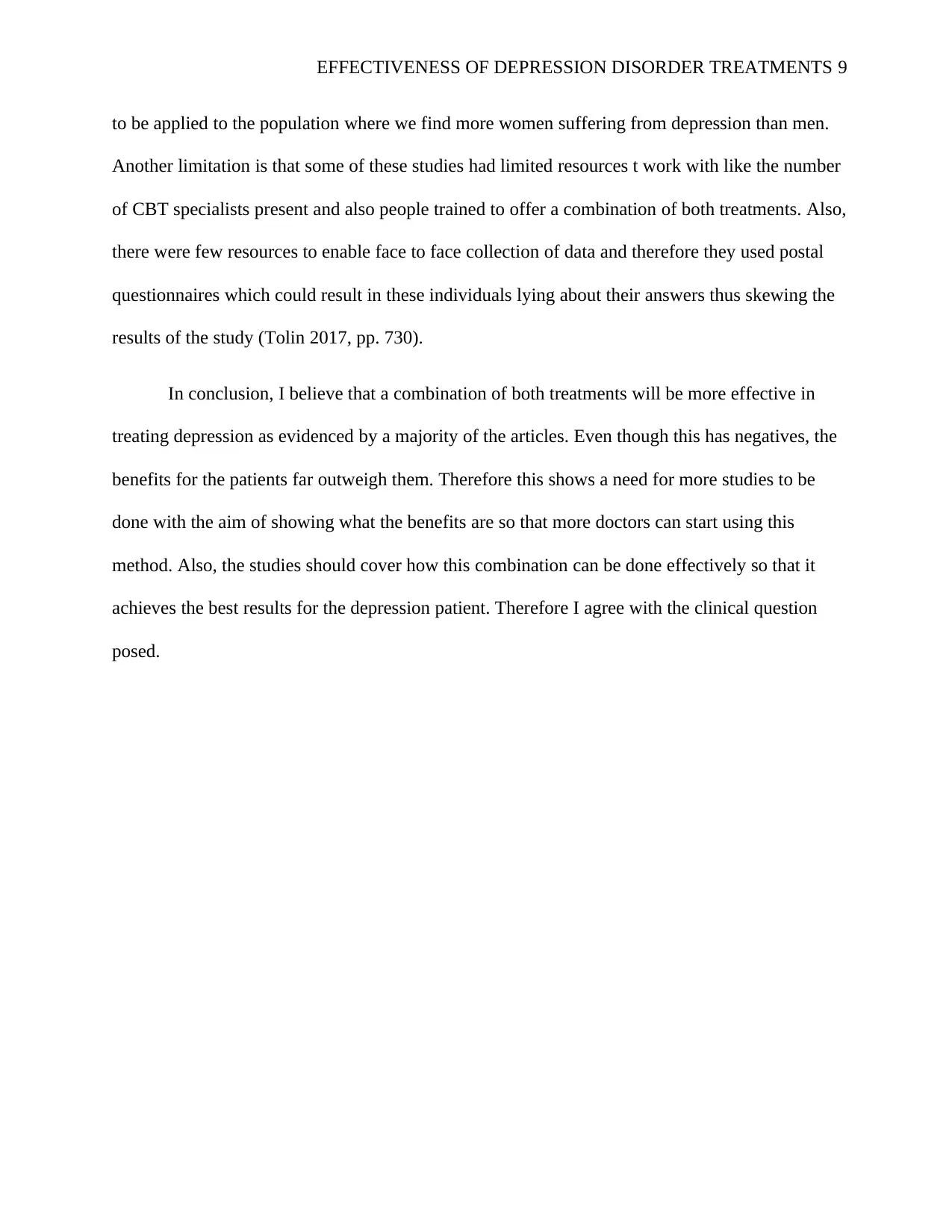
EFFECTIVENESS OF DEPRESSION DISORDER TREATMENTS 9
to be applied to the population where we find more women suffering from depression than men.
Another limitation is that some of these studies had limited resources t work with like the number
of CBT specialists present and also people trained to offer a combination of both treatments. Also,
there were few resources to enable face to face collection of data and therefore they used postal
questionnaires which could result in these individuals lying about their answers thus skewing the
results of the study (Tolin 2017, pp. 730).
In conclusion, I believe that a combination of both treatments will be more effective in
treating depression as evidenced by a majority of the articles. Even though this has negatives, the
benefits for the patients far outweigh them. Therefore this shows a need for more studies to be
done with the aim of showing what the benefits are so that more doctors can start using this
method. Also, the studies should cover how this combination can be done effectively so that it
achieves the best results for the depression patient. Therefore I agree with the clinical question
posed.
to be applied to the population where we find more women suffering from depression than men.
Another limitation is that some of these studies had limited resources t work with like the number
of CBT specialists present and also people trained to offer a combination of both treatments. Also,
there were few resources to enable face to face collection of data and therefore they used postal
questionnaires which could result in these individuals lying about their answers thus skewing the
results of the study (Tolin 2017, pp. 730).
In conclusion, I believe that a combination of both treatments will be more effective in
treating depression as evidenced by a majority of the articles. Even though this has negatives, the
benefits for the patients far outweigh them. Therefore this shows a need for more studies to be
done with the aim of showing what the benefits are so that more doctors can start using this
method. Also, the studies should cover how this combination can be done effectively so that it
achieves the best results for the depression patient. Therefore I agree with the clinical question
posed.
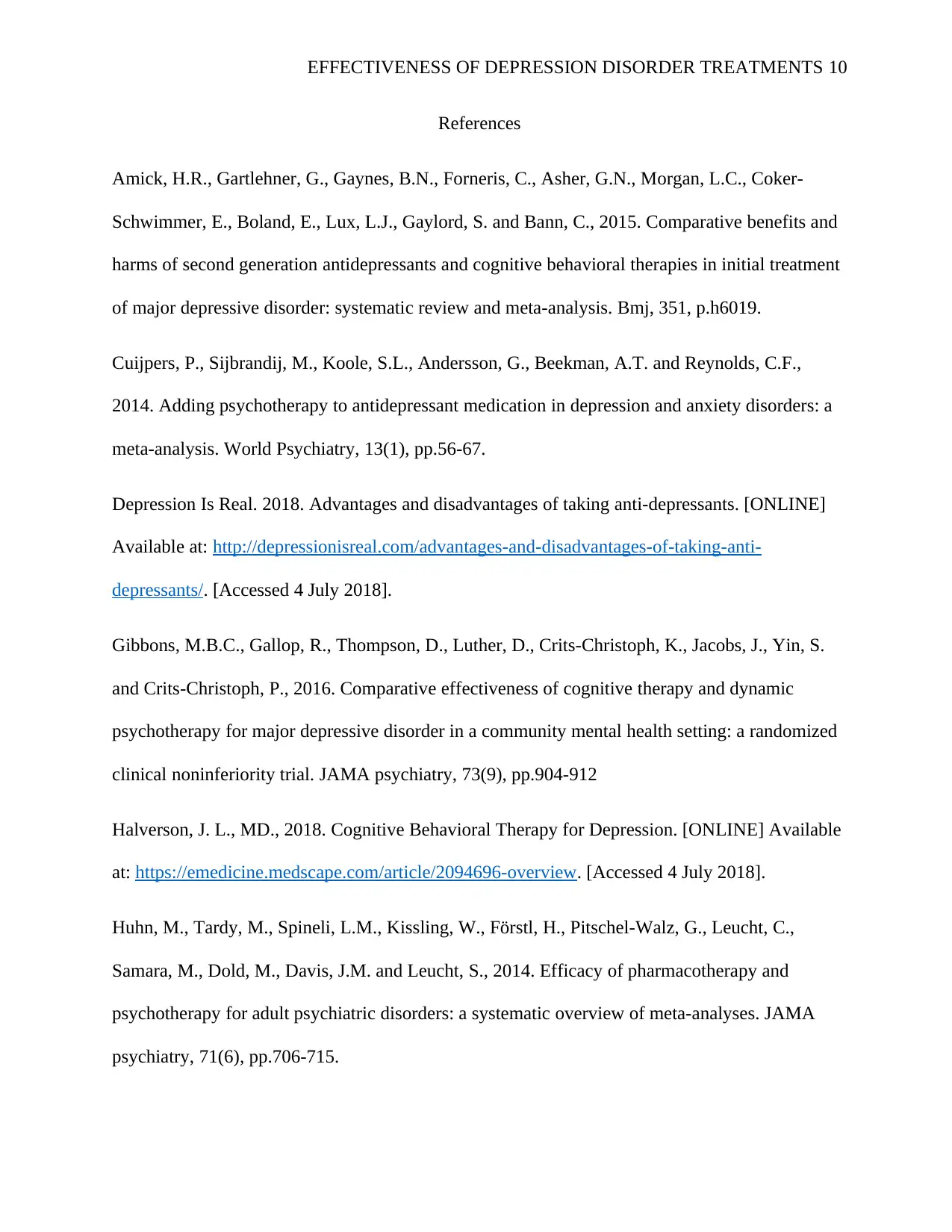
EFFECTIVENESS OF DEPRESSION DISORDER TREATMENTS 10
References
Amick, H.R., Gartlehner, G., Gaynes, B.N., Forneris, C., Asher, G.N., Morgan, L.C., Coker-
Schwimmer, E., Boland, E., Lux, L.J., Gaylord, S. and Bann, C., 2015. Comparative benefits and
harms of second generation antidepressants and cognitive behavioral therapies in initial treatment
of major depressive disorder: systematic review and meta-analysis. Bmj, 351, p.h6019.
Cuijpers, P., Sijbrandij, M., Koole, S.L., Andersson, G., Beekman, A.T. and Reynolds, C.F.,
2014. Adding psychotherapy to antidepressant medication in depression and anxiety disorders: a
meta‐analysis. World Psychiatry, 13(1), pp.56-67.
Depression Is Real. 2018. Advantages and disadvantages of taking anti-depressants. [ONLINE]
Available at: http://depressionisreal.com/advantages-and-disadvantages-of-taking-anti-
depressants/. [Accessed 4 July 2018].
Gibbons, M.B.C., Gallop, R., Thompson, D., Luther, D., Crits-Christoph, K., Jacobs, J., Yin, S.
and Crits-Christoph, P., 2016. Comparative effectiveness of cognitive therapy and dynamic
psychotherapy for major depressive disorder in a community mental health setting: a randomized
clinical noninferiority trial. JAMA psychiatry, 73(9), pp.904-912
Halverson, J. L., MD., 2018. Cognitive Behavioral Therapy for Depression. [ONLINE] Available
at: https://emedicine.medscape.com/article/2094696-overview. [Accessed 4 July 2018].
Huhn, M., Tardy, M., Spineli, L.M., Kissling, W., Förstl, H., Pitschel-Walz, G., Leucht, C.,
Samara, M., Dold, M., Davis, J.M. and Leucht, S., 2014. Efficacy of pharmacotherapy and
psychotherapy for adult psychiatric disorders: a systematic overview of meta-analyses. JAMA
psychiatry, 71(6), pp.706-715.
References
Amick, H.R., Gartlehner, G., Gaynes, B.N., Forneris, C., Asher, G.N., Morgan, L.C., Coker-
Schwimmer, E., Boland, E., Lux, L.J., Gaylord, S. and Bann, C., 2015. Comparative benefits and
harms of second generation antidepressants and cognitive behavioral therapies in initial treatment
of major depressive disorder: systematic review and meta-analysis. Bmj, 351, p.h6019.
Cuijpers, P., Sijbrandij, M., Koole, S.L., Andersson, G., Beekman, A.T. and Reynolds, C.F.,
2014. Adding psychotherapy to antidepressant medication in depression and anxiety disorders: a
meta‐analysis. World Psychiatry, 13(1), pp.56-67.
Depression Is Real. 2018. Advantages and disadvantages of taking anti-depressants. [ONLINE]
Available at: http://depressionisreal.com/advantages-and-disadvantages-of-taking-anti-
depressants/. [Accessed 4 July 2018].
Gibbons, M.B.C., Gallop, R., Thompson, D., Luther, D., Crits-Christoph, K., Jacobs, J., Yin, S.
and Crits-Christoph, P., 2016. Comparative effectiveness of cognitive therapy and dynamic
psychotherapy for major depressive disorder in a community mental health setting: a randomized
clinical noninferiority trial. JAMA psychiatry, 73(9), pp.904-912
Halverson, J. L., MD., 2018. Cognitive Behavioral Therapy for Depression. [ONLINE] Available
at: https://emedicine.medscape.com/article/2094696-overview. [Accessed 4 July 2018].
Huhn, M., Tardy, M., Spineli, L.M., Kissling, W., Förstl, H., Pitschel-Walz, G., Leucht, C.,
Samara, M., Dold, M., Davis, J.M. and Leucht, S., 2014. Efficacy of pharmacotherapy and
psychotherapy for adult psychiatric disorders: a systematic overview of meta-analyses. JAMA
psychiatry, 71(6), pp.706-715.
Secure Best Marks with AI Grader
Need help grading? Try our AI Grader for instant feedback on your assignments.
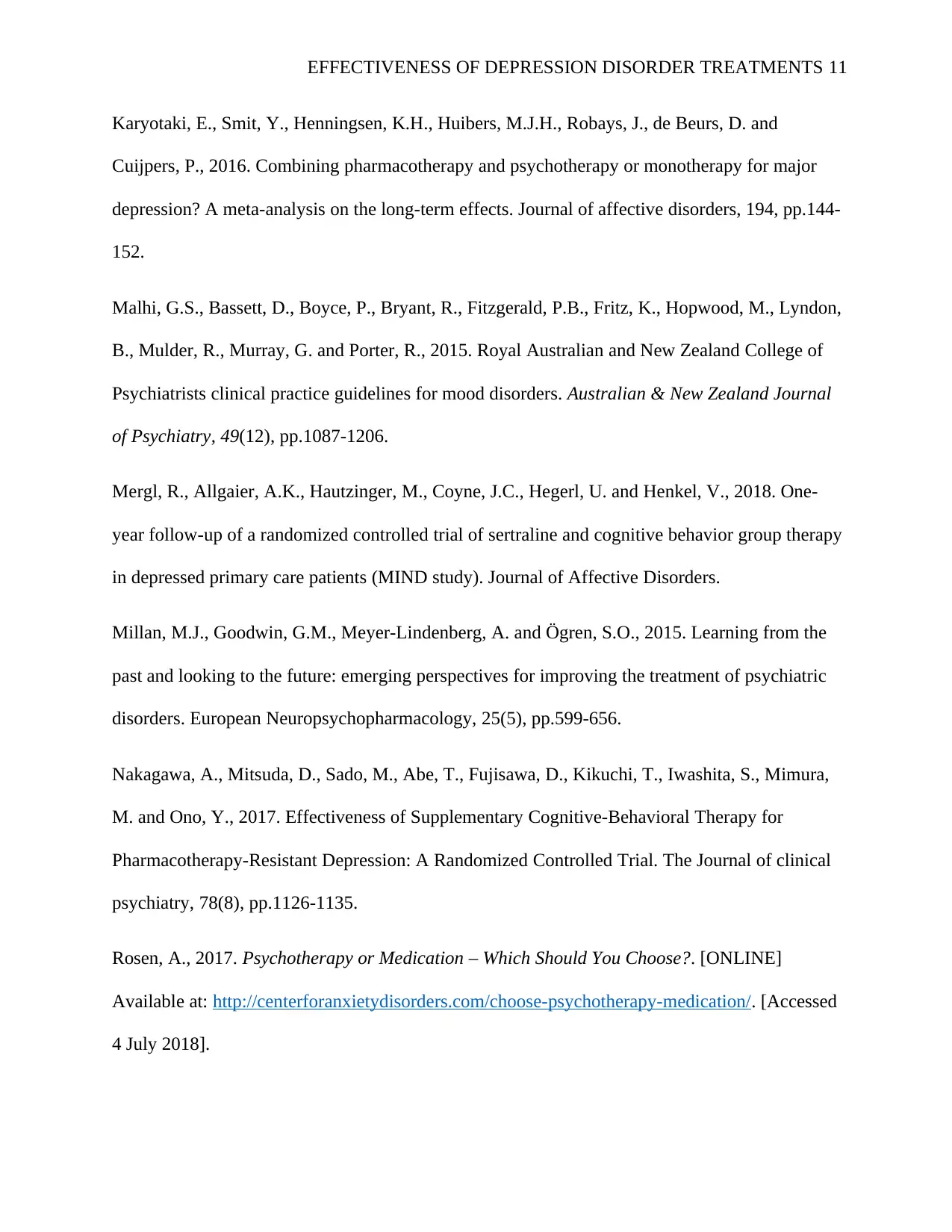
EFFECTIVENESS OF DEPRESSION DISORDER TREATMENTS 11
Karyotaki, E., Smit, Y., Henningsen, K.H., Huibers, M.J.H., Robays, J., de Beurs, D. and
Cuijpers, P., 2016. Combining pharmacotherapy and psychotherapy or monotherapy for major
depression? A meta-analysis on the long-term effects. Journal of affective disorders, 194, pp.144-
152.
Malhi, G.S., Bassett, D., Boyce, P., Bryant, R., Fitzgerald, P.B., Fritz, K., Hopwood, M., Lyndon,
B., Mulder, R., Murray, G. and Porter, R., 2015. Royal Australian and New Zealand College of
Psychiatrists clinical practice guidelines for mood disorders. Australian & New Zealand Journal
of Psychiatry, 49(12), pp.1087-1206.
Mergl, R., Allgaier, A.K., Hautzinger, M., Coyne, J.C., Hegerl, U. and Henkel, V., 2018. One-
year follow-up of a randomized controlled trial of sertraline and cognitive behavior group therapy
in depressed primary care patients (MIND study). Journal of Affective Disorders.
Millan, M.J., Goodwin, G.M., Meyer-Lindenberg, A. and Ögren, S.O., 2015. Learning from the
past and looking to the future: emerging perspectives for improving the treatment of psychiatric
disorders. European Neuropsychopharmacology, 25(5), pp.599-656.
Nakagawa, A., Mitsuda, D., Sado, M., Abe, T., Fujisawa, D., Kikuchi, T., Iwashita, S., Mimura,
M. and Ono, Y., 2017. Effectiveness of Supplementary Cognitive-Behavioral Therapy for
Pharmacotherapy-Resistant Depression: A Randomized Controlled Trial. The Journal of clinical
psychiatry, 78(8), pp.1126-1135.
Rosen, A., 2017. Psychotherapy or Medication – Which Should You Choose?. [ONLINE]
Available at: http://centerforanxietydisorders.com/choose-psychotherapy-medication/. [Accessed
4 July 2018].
Karyotaki, E., Smit, Y., Henningsen, K.H., Huibers, M.J.H., Robays, J., de Beurs, D. and
Cuijpers, P., 2016. Combining pharmacotherapy and psychotherapy or monotherapy for major
depression? A meta-analysis on the long-term effects. Journal of affective disorders, 194, pp.144-
152.
Malhi, G.S., Bassett, D., Boyce, P., Bryant, R., Fitzgerald, P.B., Fritz, K., Hopwood, M., Lyndon,
B., Mulder, R., Murray, G. and Porter, R., 2015. Royal Australian and New Zealand College of
Psychiatrists clinical practice guidelines for mood disorders. Australian & New Zealand Journal
of Psychiatry, 49(12), pp.1087-1206.
Mergl, R., Allgaier, A.K., Hautzinger, M., Coyne, J.C., Hegerl, U. and Henkel, V., 2018. One-
year follow-up of a randomized controlled trial of sertraline and cognitive behavior group therapy
in depressed primary care patients (MIND study). Journal of Affective Disorders.
Millan, M.J., Goodwin, G.M., Meyer-Lindenberg, A. and Ögren, S.O., 2015. Learning from the
past and looking to the future: emerging perspectives for improving the treatment of psychiatric
disorders. European Neuropsychopharmacology, 25(5), pp.599-656.
Nakagawa, A., Mitsuda, D., Sado, M., Abe, T., Fujisawa, D., Kikuchi, T., Iwashita, S., Mimura,
M. and Ono, Y., 2017. Effectiveness of Supplementary Cognitive-Behavioral Therapy for
Pharmacotherapy-Resistant Depression: A Randomized Controlled Trial. The Journal of clinical
psychiatry, 78(8), pp.1126-1135.
Rosen, A., 2017. Psychotherapy or Medication – Which Should You Choose?. [ONLINE]
Available at: http://centerforanxietydisorders.com/choose-psychotherapy-medication/. [Accessed
4 July 2018].
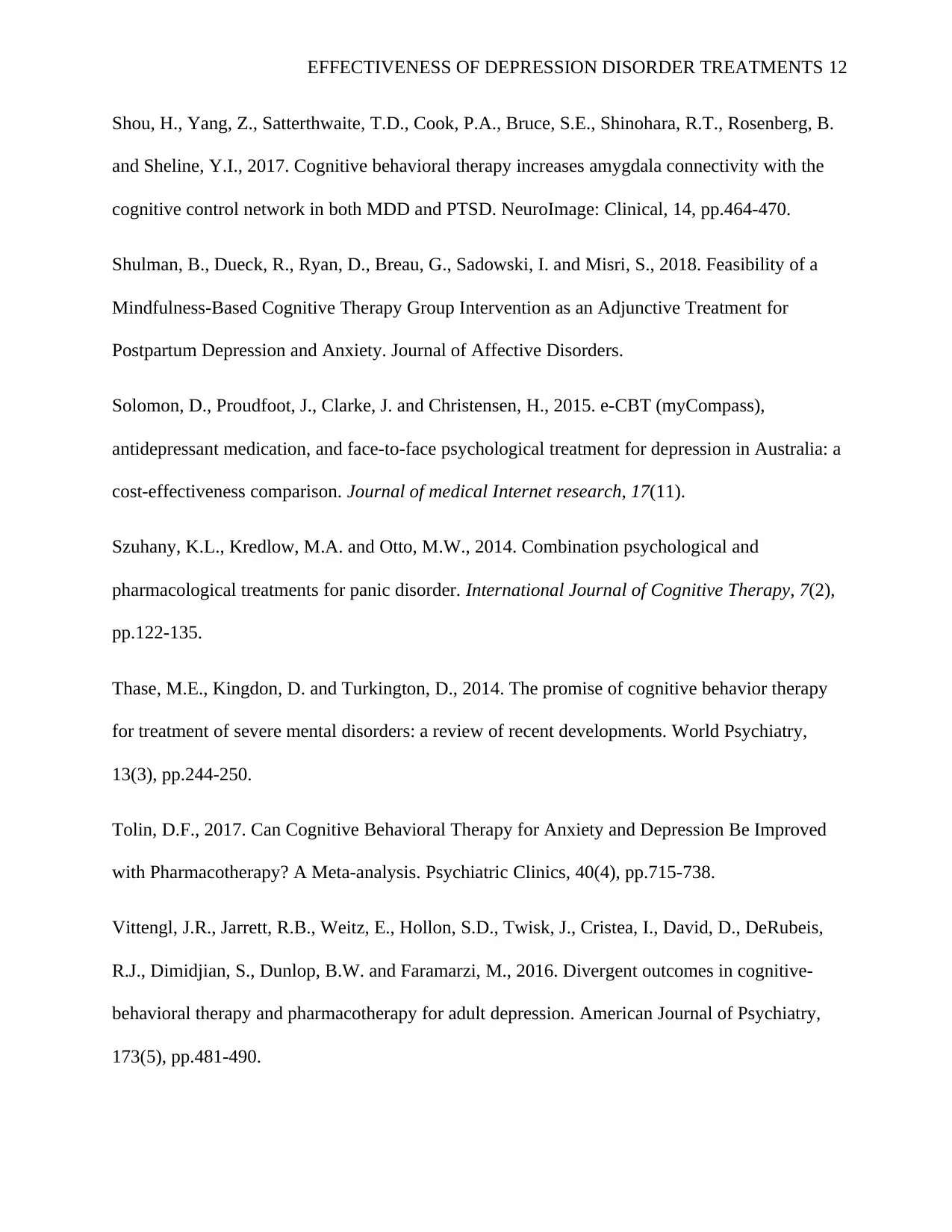
EFFECTIVENESS OF DEPRESSION DISORDER TREATMENTS 12
Shou, H., Yang, Z., Satterthwaite, T.D., Cook, P.A., Bruce, S.E., Shinohara, R.T., Rosenberg, B.
and Sheline, Y.I., 2017. Cognitive behavioral therapy increases amygdala connectivity with the
cognitive control network in both MDD and PTSD. NeuroImage: Clinical, 14, pp.464-470.
Shulman, B., Dueck, R., Ryan, D., Breau, G., Sadowski, I. and Misri, S., 2018. Feasibility of a
Mindfulness-Based Cognitive Therapy Group Intervention as an Adjunctive Treatment for
Postpartum Depression and Anxiety. Journal of Affective Disorders.
Solomon, D., Proudfoot, J., Clarke, J. and Christensen, H., 2015. e-CBT (myCompass),
antidepressant medication, and face-to-face psychological treatment for depression in Australia: a
cost-effectiveness comparison. Journal of medical Internet research, 17(11).
Szuhany, K.L., Kredlow, M.A. and Otto, M.W., 2014. Combination psychological and
pharmacological treatments for panic disorder. International Journal of Cognitive Therapy, 7(2),
pp.122-135.
Thase, M.E., Kingdon, D. and Turkington, D., 2014. The promise of cognitive behavior therapy
for treatment of severe mental disorders: a review of recent developments. World Psychiatry,
13(3), pp.244-250.
Tolin, D.F., 2017. Can Cognitive Behavioral Therapy for Anxiety and Depression Be Improved
with Pharmacotherapy? A Meta-analysis. Psychiatric Clinics, 40(4), pp.715-738.
Vittengl, J.R., Jarrett, R.B., Weitz, E., Hollon, S.D., Twisk, J., Cristea, I., David, D., DeRubeis,
R.J., Dimidjian, S., Dunlop, B.W. and Faramarzi, M., 2016. Divergent outcomes in cognitive-
behavioral therapy and pharmacotherapy for adult depression. American Journal of Psychiatry,
173(5), pp.481-490.
Shou, H., Yang, Z., Satterthwaite, T.D., Cook, P.A., Bruce, S.E., Shinohara, R.T., Rosenberg, B.
and Sheline, Y.I., 2017. Cognitive behavioral therapy increases amygdala connectivity with the
cognitive control network in both MDD and PTSD. NeuroImage: Clinical, 14, pp.464-470.
Shulman, B., Dueck, R., Ryan, D., Breau, G., Sadowski, I. and Misri, S., 2018. Feasibility of a
Mindfulness-Based Cognitive Therapy Group Intervention as an Adjunctive Treatment for
Postpartum Depression and Anxiety. Journal of Affective Disorders.
Solomon, D., Proudfoot, J., Clarke, J. and Christensen, H., 2015. e-CBT (myCompass),
antidepressant medication, and face-to-face psychological treatment for depression in Australia: a
cost-effectiveness comparison. Journal of medical Internet research, 17(11).
Szuhany, K.L., Kredlow, M.A. and Otto, M.W., 2014. Combination psychological and
pharmacological treatments for panic disorder. International Journal of Cognitive Therapy, 7(2),
pp.122-135.
Thase, M.E., Kingdon, D. and Turkington, D., 2014. The promise of cognitive behavior therapy
for treatment of severe mental disorders: a review of recent developments. World Psychiatry,
13(3), pp.244-250.
Tolin, D.F., 2017. Can Cognitive Behavioral Therapy for Anxiety and Depression Be Improved
with Pharmacotherapy? A Meta-analysis. Psychiatric Clinics, 40(4), pp.715-738.
Vittengl, J.R., Jarrett, R.B., Weitz, E., Hollon, S.D., Twisk, J., Cristea, I., David, D., DeRubeis,
R.J., Dimidjian, S., Dunlop, B.W. and Faramarzi, M., 2016. Divergent outcomes in cognitive-
behavioral therapy and pharmacotherapy for adult depression. American Journal of Psychiatry,
173(5), pp.481-490.
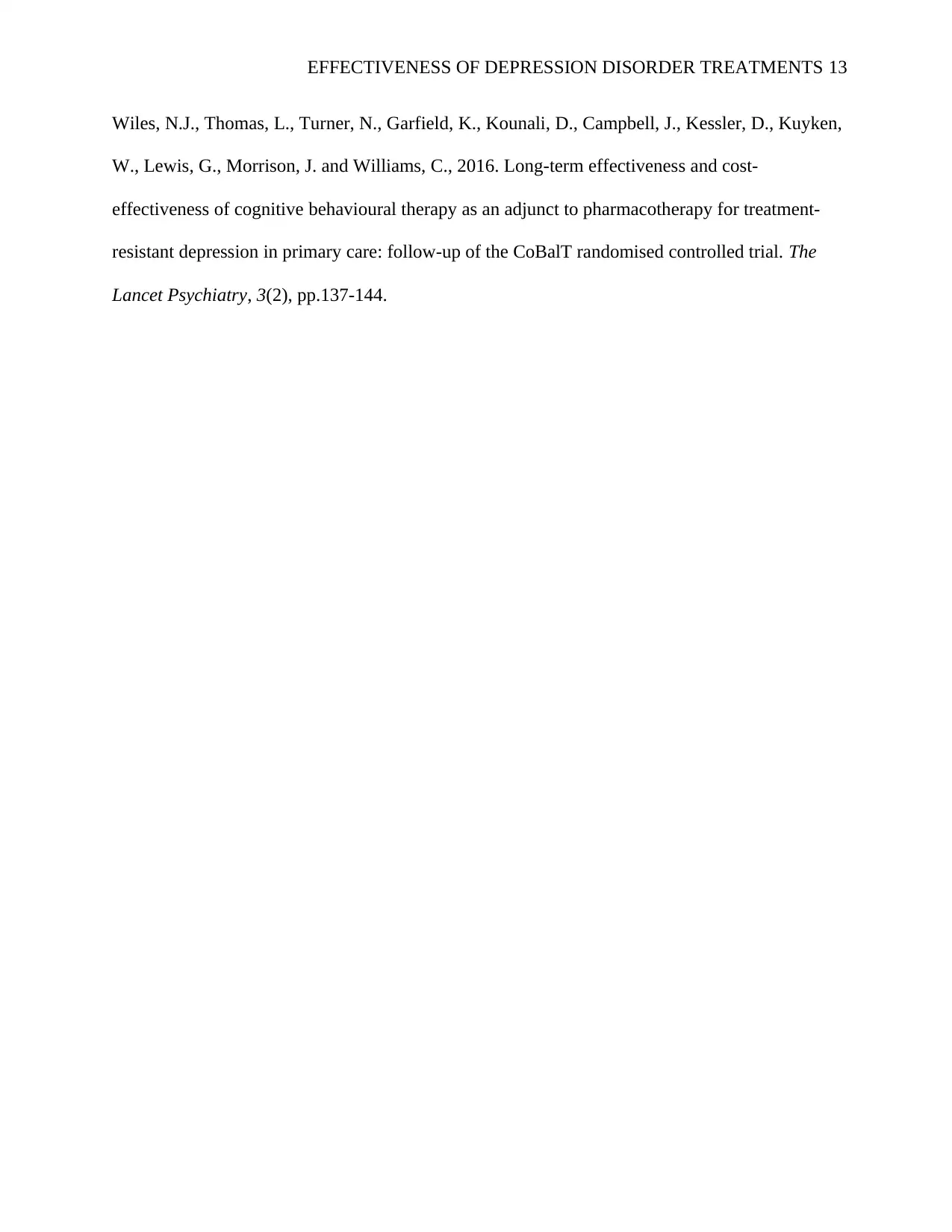
EFFECTIVENESS OF DEPRESSION DISORDER TREATMENTS 13
Wiles, N.J., Thomas, L., Turner, N., Garfield, K., Kounali, D., Campbell, J., Kessler, D., Kuyken,
W., Lewis, G., Morrison, J. and Williams, C., 2016. Long-term effectiveness and cost-
effectiveness of cognitive behavioural therapy as an adjunct to pharmacotherapy for treatment-
resistant depression in primary care: follow-up of the CoBalT randomised controlled trial. The
Lancet Psychiatry, 3(2), pp.137-144.
Wiles, N.J., Thomas, L., Turner, N., Garfield, K., Kounali, D., Campbell, J., Kessler, D., Kuyken,
W., Lewis, G., Morrison, J. and Williams, C., 2016. Long-term effectiveness and cost-
effectiveness of cognitive behavioural therapy as an adjunct to pharmacotherapy for treatment-
resistant depression in primary care: follow-up of the CoBalT randomised controlled trial. The
Lancet Psychiatry, 3(2), pp.137-144.
1 out of 13
Related Documents
Your All-in-One AI-Powered Toolkit for Academic Success.
+13062052269
info@desklib.com
Available 24*7 on WhatsApp / Email
![[object Object]](/_next/static/media/star-bottom.7253800d.svg)
Unlock your academic potential
© 2024 | Zucol Services PVT LTD | All rights reserved.





